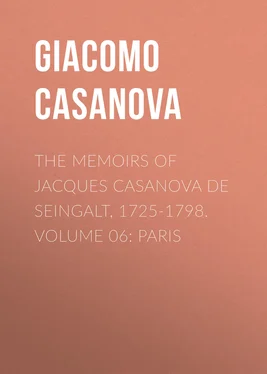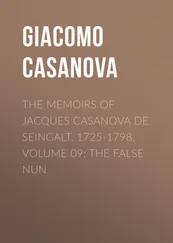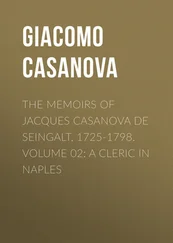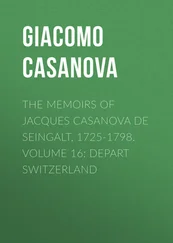Giacomo Casanova - The Memoirs of Jacques Casanova de Seingalt, 1725-1798. Volume 06 - Paris
Здесь есть возможность читать онлайн «Giacomo Casanova - The Memoirs of Jacques Casanova de Seingalt, 1725-1798. Volume 06 - Paris» — ознакомительный отрывок электронной книги совершенно бесплатно, а после прочтения отрывка купить полную версию. В некоторых случаях можно слушать аудио, скачать через торрент в формате fb2 и присутствует краткое содержание. Жанр: Биографии и Мемуары, История, foreign_edu, foreign_antique, foreign_prose, на английском языке. Описание произведения, (предисловие) а так же отзывы посетителей доступны на портале библиотеки ЛибКат.
- Название:The Memoirs of Jacques Casanova de Seingalt, 1725-1798. Volume 06: Paris
- Автор:
- Жанр:
- Год:неизвестен
- ISBN:нет данных
- Рейтинг книги:3 / 5. Голосов: 1
-
Избранное:Добавить в избранное
- Отзывы:
-
Ваша оценка:
- 60
- 1
- 2
- 3
- 4
- 5
The Memoirs of Jacques Casanova de Seingalt, 1725-1798. Volume 06: Paris: краткое содержание, описание и аннотация
Предлагаем к чтению аннотацию, описание, краткое содержание или предисловие (зависит от того, что написал сам автор книги «The Memoirs of Jacques Casanova de Seingalt, 1725-1798. Volume 06: Paris»). Если вы не нашли необходимую информацию о книге — напишите в комментариях, мы постараемся отыскать её.
The Memoirs of Jacques Casanova de Seingalt, 1725-1798. Volume 06: Paris — читать онлайн ознакомительный отрывок
Ниже представлен текст книги, разбитый по страницам. Система сохранения места последней прочитанной страницы, позволяет с удобством читать онлайн бесплатно книгу «The Memoirs of Jacques Casanova de Seingalt, 1725-1798. Volume 06: Paris», без необходимости каждый раз заново искать на чём Вы остановились. Поставьте закладку, и сможете в любой момент перейти на страницу, на которой закончили чтение.
Интервал:
Закладка:
Giacomo Casanova
The Memoirs of Jacques Casanova de Seingalt, 1725-1798. Volume 06: Paris
CHAPTER I
Leave Bologna a Happy Man—The Captain Parts from Us in Reggio, where I Spend a Delightful Night with Henriette—Our Arrival in Parma—Henriette Resumes the Costume of a Woman; Our Mutual Felicity—I Meet Some Relatives of Mine, but Do not Discover Myself
The reader can easily guess that there was a change as sudden as a transformation in a pantomime, and that the short but magic sentence, "Come to Parma," proved a very fortunate catastrophe, thanks to which I rapidly changed, passing from the tragic to the gentle mood, from the serious to the tender tone. Sooth to say, I fell at her feet, and lovingly pressing her knees I kissed them repeatedly with raptures of gratitude. No more 'furore', no more bitter words; they do not suit the sweetest of all human feelings! Loving, docile, grateful, I swear never to beg for any favour, not even to kiss her hand, until I have shewn myself worthy of her precious love! The heavenly creature, delighted to see me pass so rapidly from despair to the most lively tenderness, tells me, with a voice the tone of which breathes of love, to get up from my knees.
"I am sure that you love me," says she, "and be quite certain that I shall leave nothing undone to secure the constancy of your feelings." Even if she had said that she loved me as much as I adored her, she would not have been more eloquent, for her words expressed all that can be felt. My lips were pressed to her beautiful hands as the captain entered the room. He complimented us with perfect good faith, and I told him, my face beaming with happiness, that I was going to order the carriage. I left them together, and in a short time we were on our road, cheerful, pleased, and merry.
Before reaching Reggio the honest captain told me that in his opinion it would be better for him to proceed to Parma alone, as, if we arrived in that city all together, it might cause some remarks, and people would talk about us much less if we were without him. We both thought him quite right, and we immediately made up our minds to pass the night in Reggio, while the captain would take a post-chaise and go alone to Parma. According to that arrangement his trunk was transferred to the vehicle which he hired in Reggio, he bade us farewell and went away, after having promised to dine with us on the following day in Parma.
The decision taken by the worthy Hungarian was, doubtless, as agreeable to my lovely friend as to me, for our delicacy would have condemned us to a great reserve in his presence. And truly, under the new circumstances, how were we to arrange for our lodgings in Reggio? Henriette could not, of course, share the bed of the captain any more, and she could not have slept with me as long as he was with us, without being guilty of great immodesty. We should all three have laughed at that compulsory reserve which we would have felt to be ridiculous, but we should, for all that, have submitted to it. Love is the little impudent god, the enemy of bashfulness, although he may very often enjoy darkness and mystery, but if he gives way to it he feels disgraced; he loses three-fourths of his dignity and the greatest portion of his charms.
Evidently there could be no happiness for Henriette or for me unless we parted with the person and even with the remembrance of the excellent captain.
We supped alone. I was intoxicated with a felicity which seemed too immense, and yet I felt melancholy, but Henriette, who looked sad likewise, had no reproach to address to me. Our sadness was in reality nothing but shyness; we loved each other, but we had had no time to become acquainted. We exchanged only a few words, there was nothing witty, nothing interesting in our conversation, which struck us both as insipid, and we found more pleasure in the thoughts which filled our minds. We knew that we were going to pass the night together, but we could not have spoken of it openly. What a night! what a delightful creature was that Henriette whom I have loved so deeply, who has made me so supremely happy!
It was only three or four days later that I ventured on asking her what she would have done, without a groat in her possession, having not one acquaintance in Parma, if I had been afraid to declare my love, and if I had gone to Naples. She answered that she would doubtless have found herself in very great difficulties, but that she had all along felt certain of my love, and that she had foreseen what had happened. She added that, being impatient to know what I thought of her, she had asked me to translate to the captain what she had expressed respecting her resolution, knowing that he could neither oppose that resolution nor continue to live with her, and that, as she had taken care not to include me in the prayer which she had addressed to him through me, she had thought it impossible that I should fail to ask whether I could be of some service to her, waiting to take a decision until she could have ascertained the nature of my feelings towards her. She concluded by telling me that if she had fallen it was the fault of her husband and of her father-in-law, both of whom she characterized as monsters rather than men.
When we reached Parma, I gave the police the name of Farusi, the same that I had assumed in Cesena; it was the family name of my mother; while Henriette wrote down, "Anne D'Arci, from France." While we were answering the questions of the officer, a young Frenchman, smart and intelligent-looking, offered me his services, and advised me not to put up at the posting-inn, but to take lodgings at D'Andremorit's hotel, where I should find good apartments, French cooking, and the best French wines.
Seeing that Henriette was pleased with the proposal, I told the young manto take us there, and we were soon very comfortably lodged. I engaged theFrenchman by the day, and carefully settled all my arrangements withD'Andremont. After that I attended to the housing of my carriage.
Coming in again for a few minutes, I told Henriette that I would return in time for dinner, and, ordering the servant to remain in the ante-room, I went out alone.
Parma was then groaning under a new government. I had every reason to suppose that there were spies everywhere and under every form. I therefore did not want to have at my heels a valet who might have injured rather than served me. Though I was in my father's native city, I had no acquaintances there, but I knew that I should soon find my way.
When I found myself in the streets, I scarcely could believe that I was in Italy, for everything had a tramontane appearance. I heard nothing but French and Spanish, and those who did not speak one of those languages seemed to be whispering to one another. I was going about at random, looking for a hosier, yet unwilling to enquire where I could find one; at last I saw what I wanted.
I entered the shop, and addressing myself to a stout, good-looking woman seated behind the counter, I said,
"Madam, I wish to make some purchases."
"Sir, shall I send for someone speaking French?"
"You need not do so, I am an Italian."
"God be praised! Italians are scarce in these days."
"Why scarce?"
"Do you not know that Don Philip has arrived, and that his wife, Madame de France, is on the road?"
"I congratulate you, for it must make trade very good. I suppose that money is plentiful, and that there is abundance of all commodities."
"That is true, but everything is high in price, and we cannot get reconciled to these new fashions. They are a bad mixture of French freedom and Spanish haughtiness which addles our brains. But, sir, what sort of linen do you require?"
"In the first place, I must tell you that I never try to drive a hard bargain, therefore be careful. If you charge me too much, I shall not come again. I want some fine linen for twenty-four chemises, some dimity for stays and petticoats, some muslin, some cambric for pocket-handkerchiefs, and many other articles which I should be very glad to find in your shop, for I am a stranger here, and God knows in what hands I am going to trust myself!"
Читать дальшеИнтервал:
Закладка:
Похожие книги на «The Memoirs of Jacques Casanova de Seingalt, 1725-1798. Volume 06: Paris»
Представляем Вашему вниманию похожие книги на «The Memoirs of Jacques Casanova de Seingalt, 1725-1798. Volume 06: Paris» списком для выбора. Мы отобрали схожую по названию и смыслу литературу в надежде предоставить читателям больше вариантов отыскать новые, интересные, ещё непрочитанные произведения.
Обсуждение, отзывы о книге «The Memoirs of Jacques Casanova de Seingalt, 1725-1798. Volume 06: Paris» и просто собственные мнения читателей. Оставьте ваши комментарии, напишите, что Вы думаете о произведении, его смысле или главных героях. Укажите что конкретно понравилось, а что нет, и почему Вы так считаете.












